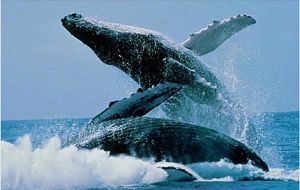MercoPress. South Atlantic News Agency
Humpback whales in Chilean sanctuaries to be tracked with GPS
 An estimated 120 whales home in the Magellan Strait region, according to Biomar Foundation
An estimated 120 whales home in the Magellan Strait region, according to Biomar Foundation Starting December, scientists from Chile’s Biomar Foundation will use GPS (Global Positioning System) to follow the movements of humpback whales in protected marine area Francisco Coloane, in the Magellan Strait. The whales are to be monitored for 12 months.
The objective is to determine which areas the whales most frequent in the park. This information will aid scientists to establish how best to protect the endangered species. The results will also help tour operators identify the best places to spot the whales, said Biomar president Roberto de Andrade.
The initiative is being financed by Brazilian multinational energy company Petrobas.
“This is a collaborative effort between the scientific and the business world committed a non-lethal treatment of the species,” said De Andrade. “Regulations will be put in place determining how close boats can come to the whales to avoid causing them stress.”
The GPS devices will enable scientists to track the whales from large distances. During the winter, the whales leave for warmer waters off the coast of Costa Rica, Panama, Colombia and Ecuador.
“In previous studies we have photo-identified 90 whales, but we now estimate that there must be around 120,” said Anelio Aguayo, chief investigator of the project.
“Now, with more resources we will be able to better scour the area. By the end of 2011 we hope to be able to say that we have a whale population of at least 150.”
The project is also to include an educational element. In some local schools, children are to be allocated whales to sponsor and adopt, thus allowing them to monitor their movements. Scientists are also to deliver talks to the students with information about the species.
By Sasha Magill – Santiago Times




Top Comments
Disclaimer & comment rulesCommenting for this story is now closed.
If you have a Facebook account, become a fan and comment on our Facebook Page!